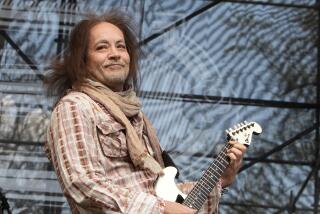Rodney King shot while riding bike
After his 1991 videotaped beating by four white Los Angeles police officers whose acquittal touched off the 1992 riots, Rodney G. King became an overnight celebrity who symbolized for many the perception of unfair treatment of young black men by police.
But, since then, the spotlight has shifted to King’s long series of run-ins with police and domestic disputes.
Television cameras swarmed his house once again Thursday after an incident Wednesday night in which he told authorities that he was riding his bicycle after 11 p.m. in a dicey area near the border of San Bernardino and Rialto and was sprayed with pellets from a shotgun.
He reportedly pedaled his bike for roughly a mile to his Jackson Street home in Rialto before calling police and heading to the hospital in an ambulance.
Rialto police, who were the first to respond, said King was intoxicated when they arrived and that it was difficult to decipher what had happened.
“We sent a couple of officers out to his address here in Rialto, but he didn’t really tell us a whole lot other than he’d been shot,” said Rialto Police Sgt. Don Lewis. “It looked like birdshot, looked like a long-distance shot.”
On Thursday morning, San Bernardino Police Lt. Scott Paterson said police were still trying to determine what “was factual.”
In interviews with investigators who visited him Thursday afternoon at Arrowhead Regional Medical Center in Colton, King reported that a man and a woman approached him and demanded his bicycle.
When he rode away, King told investigators, someone sprayed his shoulder with pellets from a shotgun. King had pellet wounds on his face, arm and back, Paterson said.
Police still seemed puzzled by the incident late Thursday.
Paterson said King offered few details about the suspects. “We are hoping somebody witnessed the incident.”
The 1992 L.A. riots erupted after a jury acquitted the LAPD officers in the videotaped beating. King was launched into the media stratosphere with his famous “Can we all get along?” plea to stop the riots.
For a moment, he seemed headed toward a public role as a voice against police brutality -- speaking to students in Southern California and at rallies intended to draw attention to police abuse. He ruminated to Los Angeles Times Magazine in the late 1990s about aspirations to start a summer surfing youth foundation in which children of different races could spend time together and “make this world a better place to live.”
But King continually struggled with legal and substance-abuse troubles:
* In May 1991, he was arrested on suspicion of trying to run over a vice officer who allegedly found him with a transvestite prostitute in Hollywood, but no charges were filed.
* In 1993, King entered an alcohol rehabilitation program and was placed on probation after crashing his vehicle into a block wall in downtown Los Angeles with a blood-alcohol level twice the legal limit.
* In July 1995, he was arrested by Alhambra police, who alleged that he hit his wife with his car, knocking her to the ground. He was sentenced to 90 days in jail after being convicted of hit and run.
* In 1999, he was sentenced to 90 days in San Bernardino County jail and put on probation for four years after a domestic dispute involving one of his daughters and her mother. He was required to attend a batterer’s treatment program and a child-abuse program, according to court records.
* In 2001, King was ordered to attend a yearlong drug treatment program after he was arrested for indecent exposure and being under the influence of PCP at Ganesha Park in Pomona.
* In April 2003, Rialto police watched him weave through traffic in his Ford Expedition at more than 100 mph before plowing through a fence and into a San Bernardino house. He pleaded guilty to being under the influence of PCP and was sentenced to a six-month drug rehabilitation program followed by a 120-day jail sentence.
* That October, Rialto police arrested King on suspicion of punching his girlfriend in the stomach.
Susan Mickey, a spokeswoman for the San Bernardino County district attorney, said the office declined to prosecute the domestic violence case in 2003 and a subsequent September 2005 domestic violence case because of a lack of evidence.
In the September 2005 incident, King was arrested on suspicion of threatening to kill one of his daughters and her mother after the two women argued with his then-girlfriend, the Associated Press reported at the time.
In the last six to eight months, Rialto police have been to King’s home numerous times, but for quieter calls.
“It was normal neighborhood stuff . . . drinking and loud parties, stuff like that,” said Lewis, the Rialto police sergeant.
More to Read
Sign up for Essential California
The most important California stories and recommendations in your inbox every morning.
You may occasionally receive promotional content from the Los Angeles Times.











